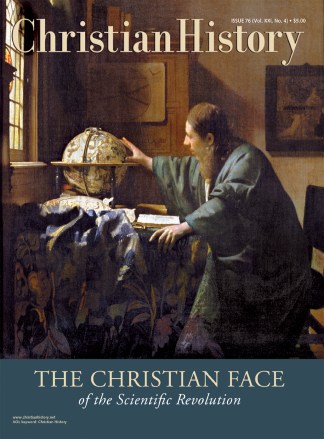Before I started working on this issue, I had always harbored (though fancying I knew better) a vague, unsettling notion that the things of science and the things of God are somehow incompatible. Attached to this was an equally disturbing sense that, throughout its history, the church had seen science as a potential threat to the faith.
This shadowy sense of a historical tension between faith and science is a pretty disruptive poltergeist in the mental house of any modern Christian who suffers with it. For, after all, we live this science. Even the confirmed Luddites among us find our lives entangled, improved, and burdened a hundred ways each day by modern science. And we live, or try to live, this faith. That is, we know we have our being in Godand should have our minds conformed to Christwhile at our computers, in our cars, at the doctor’s office, and everywhere else science meets us.
So if there’s some kind of inherent opposition between faith and science, this is a problem.
Is there, then? Or at least, has there been?
Historian of science David Lindberg lays out a panoramic answer to this question in this issue’s Link Interview (p. 44). Lindberg traces the long history of the interaction between Christianity and science back to the earliest days of the faith, and what he finds there is eye-opening.
Philosopher Peter Harrison adds a dimension to this long view as he identifies, in his “God of Math and Order” (p. 18), three changes in Christian theology that contributed to the progress of scientific revolution.
A more impressionistic answer, with some of the mysterious power of impressionist paintings, develops out of the rich colors and fine details of this issue’s biographical articles. Here emerges, life by fascinating life, a group portrait of individuals gifted with a genius for studying the natural world.
These men were quirky, sometimes unorthodox in their theology, often struggling with aspects of their faith. Yet they were convinced, to a man, that when they peered through their lenses, worked out their equations, or conducted their experiments, they were gaining a privileged insight into God’s glory, in all of its macroscopic and microscopic detail.
This approach—the design of this issue as a gallery of mini-biographies chosen to illustrate a topic—is a new one for us. But I think it works. It leads us out of the fog that hangs around this subject and helps us discover what was always there, hidden behind: the tremendous power and attractiveness of science practiced as a Christian vocation.
Copyright 2002 by the author or Christianity Today/Christianity History magazine. Click for reprint information on Christian History.










